Pat O’Sullivan, founder and CEO of Irish catering company Master Chefs, is no stranger to farming. One of eight children, he grew up on his family’s farm in Kerry – though he admits that as a child he preferred to spend more time in the kitchen than out in the fields.
“My love for food came from my mother,” he says. “Of the eight of us, I was probably the one that spent most of the time in the kitchen. I was watching what my mother was doing rather than being out doing the hard graft with my father!”
Career in food
Pat started to cook professionally in his late teens,an introduction which would lead to a rich career in food. In 1997, he captained Ireland’s culinary team in the World Master Chefs, leading the team to a win in the World Banqueting Championships. He worked through a variety of restaurants and establishments. However, after 18 years in professional kitchens – and like so many other chefs – he could sense career burnout on the horizon.
“I left cheffing and set up Master Chefs in 2000,” he tells Irish Country Living. “This evolved from a chef who was on the World Master Chefs team with me – we had become mates. He had Master Chefs already set up in Dublin. I saw what he was doing and I thought, ‘Wow’ – he was catering to a really high standard and was certainly the industry leader, at the time.
“I left my job at 32 years of age,” he continues. “I just thought, ‘I’ll burn out by the time I’m 40.’ So I did a complete pivot. I wasn’t 100% sure of what I was doing – I had young kids and a mortgage, but I just decided to go for it. So I set up Master Chefs and mirrored what [my friend] was doing in Dublin; catering events around the country. Master Chefs Dublin ceased operations in around 2006-07, but we were a separate entity.
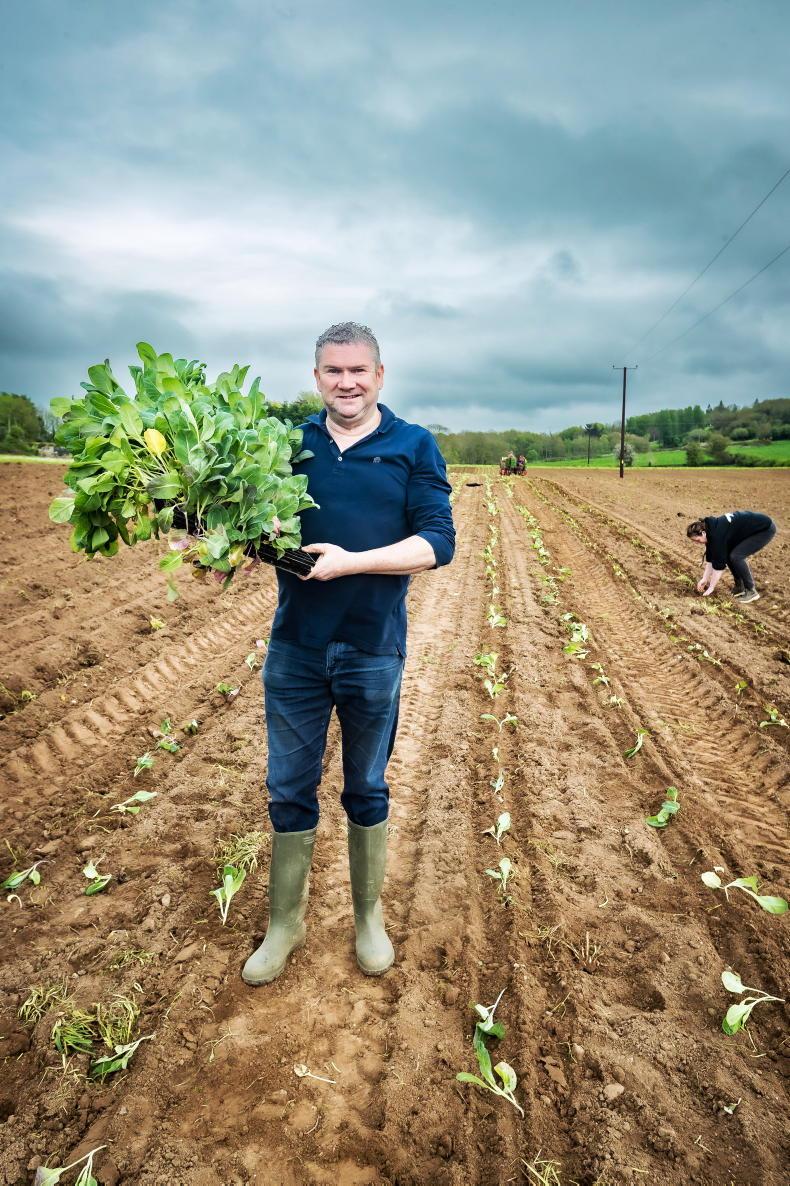
Pat O'Sullivan grew up on a small farm in Co Kerry and has returned to farming with the purchase of 20ac in Co Limerick, where he will grow vegetables for Master Chef's menus
“One success has led to another for us,” he continues. “When times were tough, we never cut quality. We would rather sacrifice margin and I suppose that’s what stood to us.”
Going for growth
After overcoming the difficulties of the 2008 recession and with a permanent headquarters in place, Pat and his team began to expand into different areas of catering – namely, healthcare, education (Master Chefs caters to colleges and universities around the country) and – perhaps their most interesting area – sports nutrition. This has brought contracts with sports clubs, including Munster rugby, who are based in Limerick.
This has been a career highlight for Pat, who says the working relationships they have with the team’s lead nutritionist has been highly educational. Devising new ways to make nutritious food taste great and catering to younger generations through their college contracts has helped Master Chefs better understand consumers’ changing approaches to food and sustainability.
“We work with the Munster Rugby players,” Pat explains. “With the support of their lead nutritionist, we manage their diets. We feed them in the high performance centre every day and on away days [they get takeaway meals and we drop meals to Shannon Airport for them to travel with]. That, combined with the student aspect of our business, has made a big difference. [I always say], just watch the students and how they eat today compared to ten years ago – understanding them has really shaped us in terms of our sustainability goals and our carbon footprint.”
Finding the farm
For some time, Pat had wanted to start an organic farm where they could grow their own ingredients. In 2021, this dream became a reality with the purchase of their 20ac farm; conveniently located in Ballyneety – just a 10-minute drive from their production kitchen in Limerick. While this move seems innovative and forward-thinking, Pat says, in reality, the farm has been a natural progression.
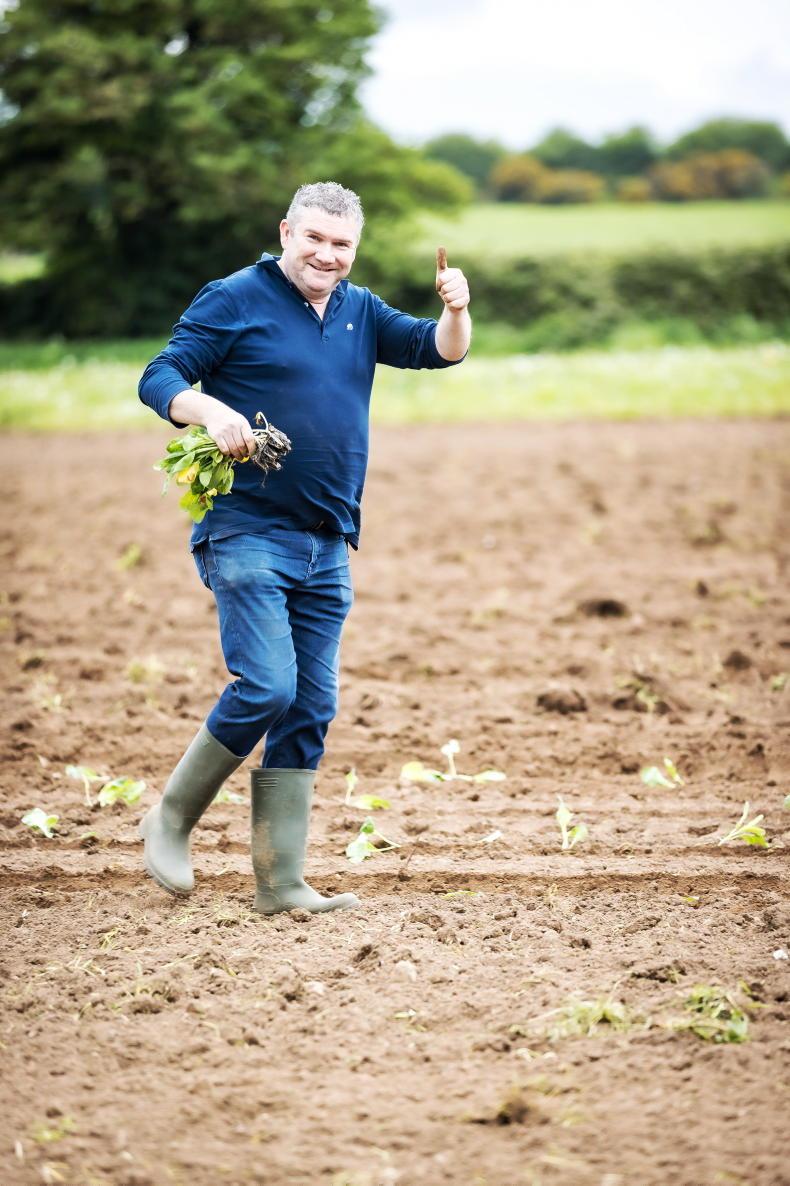
Pat loves farming as it's in his blood and jokingly says the Master Chef farm is his retirement plan
“Really, we’ve been on this trajectory for years,” he says. “Farming is quite normal for me – it’s not at all daunting. Especially organic farming, because when I grew up in the 1970s and 80s, we were organic farming – we just didn’t have fancy labels for it.
“For years, we’d been looking for a farm which was both suitable and well located; it was extremely hard to find,” he continues. “I knew exactly what I wanted. What sold this location to me was when it went to auction, I think there were maybe 50 bidders [farmers] in the room and they had to take the auction out onto the street, as it was during COVID and so many were in attendance. There was a lot of interest, which reinforced to me that I was buying the right land.”
Tackling waste
In a world where multinational catering companies are the goliaths and smaller Irish businesses (like Pat’s) the Davids, Master Chefs has maintained a loyal customer base thanks to this commitment to quality and sustainability. Aside from now growing their own produce, they also plan to tackle food waste with an elaborate composting programme. Once fully established, Master Chefs will be able to remove their food waste from catering sites, take it back to the farm, compost it and put it back into the soil.
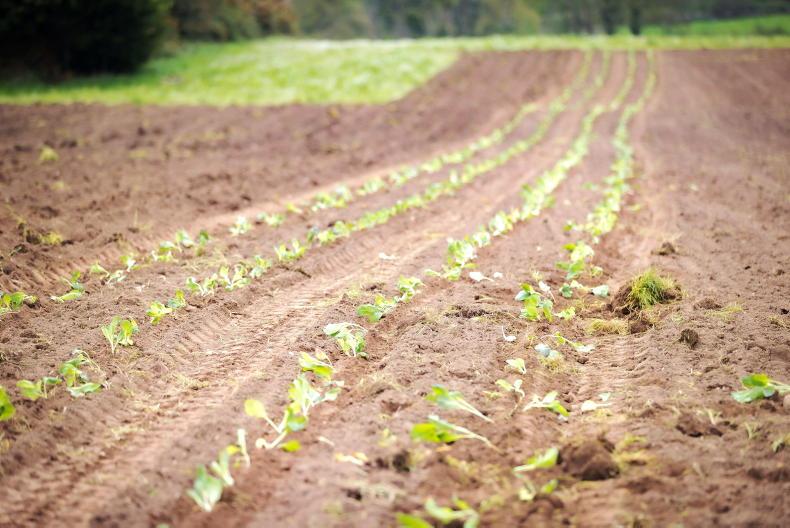
The Master Chefs farm will not only grow their produce; they hope it will become a centre of sustainable food education
“We’ve already been using fully compostable materials [and packaging] for years,” he explains. “Our bins [in college locations] will be exclusively ours, so we will take back our own waste. We will have a compartment in the vans for food waste. I am working with a company in Navan who make composting units and we’re setting those up at the farm.”
Centre for education
Pat isn’t thinking in terms of months with this project – he is thinking in years and generations. For this forward-thinking approach, this year he was awarded the Local Food Hero for Limerick during the Irish Restaurant Awards. He says the farm was a huge investment and jokingly says it’s his retirement plan (“I’ll just [happily] work away on the farm!”), before explaining that they hope it becomes a centre of education and information sharing.
“It’s going to be an educational centre for organic growing and food sustainability,” he says. “I’m a real believer in continued education. We’ll bring tours through and maybe even get some of the rugby players out for some hard manual labour!”
masterchefs.ie
Read more
New food network launched in Galway with month-long festival planned
Taste tradition: belly of the island
Pat O’Sullivan, founder and CEO of Irish catering company Master Chefs, is no stranger to farming. One of eight children, he grew up on his family’s farm in Kerry – though he admits that as a child he preferred to spend more time in the kitchen than out in the fields.
“My love for food came from my mother,” he says. “Of the eight of us, I was probably the one that spent most of the time in the kitchen. I was watching what my mother was doing rather than being out doing the hard graft with my father!”
Career in food
Pat started to cook professionally in his late teens,an introduction which would lead to a rich career in food. In 1997, he captained Ireland’s culinary team in the World Master Chefs, leading the team to a win in the World Banqueting Championships. He worked through a variety of restaurants and establishments. However, after 18 years in professional kitchens – and like so many other chefs – he could sense career burnout on the horizon.
“I left cheffing and set up Master Chefs in 2000,” he tells Irish Country Living. “This evolved from a chef who was on the World Master Chefs team with me – we had become mates. He had Master Chefs already set up in Dublin. I saw what he was doing and I thought, ‘Wow’ – he was catering to a really high standard and was certainly the industry leader, at the time.
“I left my job at 32 years of age,” he continues. “I just thought, ‘I’ll burn out by the time I’m 40.’ So I did a complete pivot. I wasn’t 100% sure of what I was doing – I had young kids and a mortgage, but I just decided to go for it. So I set up Master Chefs and mirrored what [my friend] was doing in Dublin; catering events around the country. Master Chefs Dublin ceased operations in around 2006-07, but we were a separate entity.

Pat O'Sullivan grew up on a small farm in Co Kerry and has returned to farming with the purchase of 20ac in Co Limerick, where he will grow vegetables for Master Chef's menus
“One success has led to another for us,” he continues. “When times were tough, we never cut quality. We would rather sacrifice margin and I suppose that’s what stood to us.”
Going for growth
After overcoming the difficulties of the 2008 recession and with a permanent headquarters in place, Pat and his team began to expand into different areas of catering – namely, healthcare, education (Master Chefs caters to colleges and universities around the country) and – perhaps their most interesting area – sports nutrition. This has brought contracts with sports clubs, including Munster rugby, who are based in Limerick.
This has been a career highlight for Pat, who says the working relationships they have with the team’s lead nutritionist has been highly educational. Devising new ways to make nutritious food taste great and catering to younger generations through their college contracts has helped Master Chefs better understand consumers’ changing approaches to food and sustainability.
“We work with the Munster Rugby players,” Pat explains. “With the support of their lead nutritionist, we manage their diets. We feed them in the high performance centre every day and on away days [they get takeaway meals and we drop meals to Shannon Airport for them to travel with]. That, combined with the student aspect of our business, has made a big difference. [I always say], just watch the students and how they eat today compared to ten years ago – understanding them has really shaped us in terms of our sustainability goals and our carbon footprint.”
Finding the farm
For some time, Pat had wanted to start an organic farm where they could grow their own ingredients. In 2021, this dream became a reality with the purchase of their 20ac farm; conveniently located in Ballyneety – just a 10-minute drive from their production kitchen in Limerick. While this move seems innovative and forward-thinking, Pat says, in reality, the farm has been a natural progression.

Pat loves farming as it's in his blood and jokingly says the Master Chef farm is his retirement plan
“Really, we’ve been on this trajectory for years,” he says. “Farming is quite normal for me – it’s not at all daunting. Especially organic farming, because when I grew up in the 1970s and 80s, we were organic farming – we just didn’t have fancy labels for it.
“For years, we’d been looking for a farm which was both suitable and well located; it was extremely hard to find,” he continues. “I knew exactly what I wanted. What sold this location to me was when it went to auction, I think there were maybe 50 bidders [farmers] in the room and they had to take the auction out onto the street, as it was during COVID and so many were in attendance. There was a lot of interest, which reinforced to me that I was buying the right land.”
Tackling waste
In a world where multinational catering companies are the goliaths and smaller Irish businesses (like Pat’s) the Davids, Master Chefs has maintained a loyal customer base thanks to this commitment to quality and sustainability. Aside from now growing their own produce, they also plan to tackle food waste with an elaborate composting programme. Once fully established, Master Chefs will be able to remove their food waste from catering sites, take it back to the farm, compost it and put it back into the soil.

The Master Chefs farm will not only grow their produce; they hope it will become a centre of sustainable food education
“We’ve already been using fully compostable materials [and packaging] for years,” he explains. “Our bins [in college locations] will be exclusively ours, so we will take back our own waste. We will have a compartment in the vans for food waste. I am working with a company in Navan who make composting units and we’re setting those up at the farm.”
Centre for education
Pat isn’t thinking in terms of months with this project – he is thinking in years and generations. For this forward-thinking approach, this year he was awarded the Local Food Hero for Limerick during the Irish Restaurant Awards. He says the farm was a huge investment and jokingly says it’s his retirement plan (“I’ll just [happily] work away on the farm!”), before explaining that they hope it becomes a centre of education and information sharing.
“It’s going to be an educational centre for organic growing and food sustainability,” he says. “I’m a real believer in continued education. We’ll bring tours through and maybe even get some of the rugby players out for some hard manual labour!”
masterchefs.ie
Read more
New food network launched in Galway with month-long festival planned
Taste tradition: belly of the island







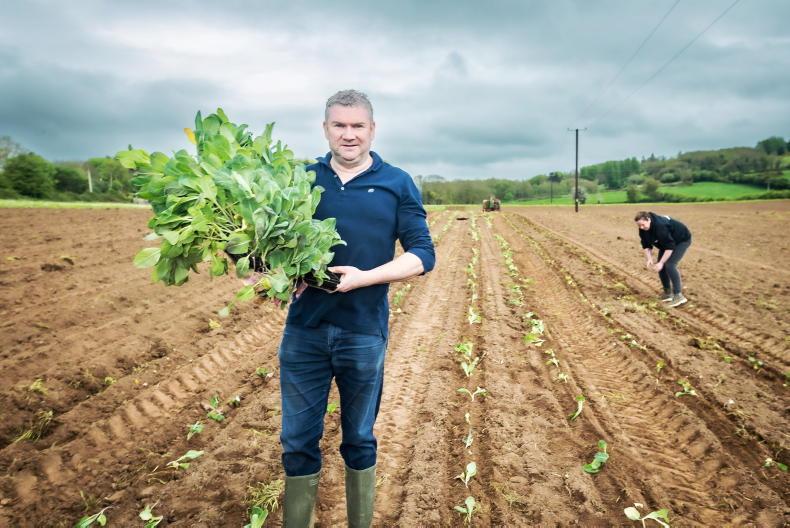
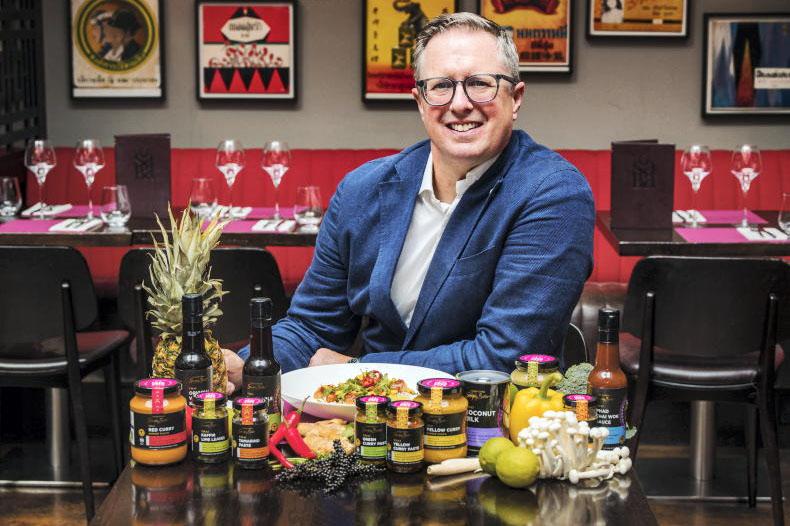
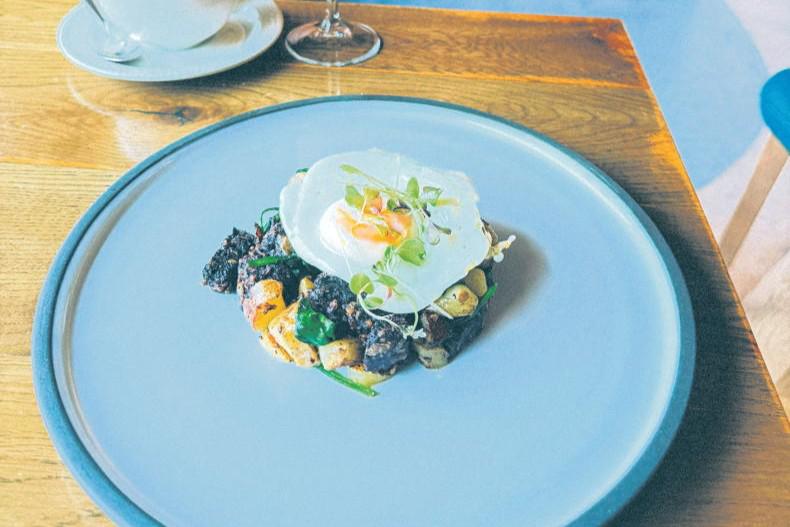
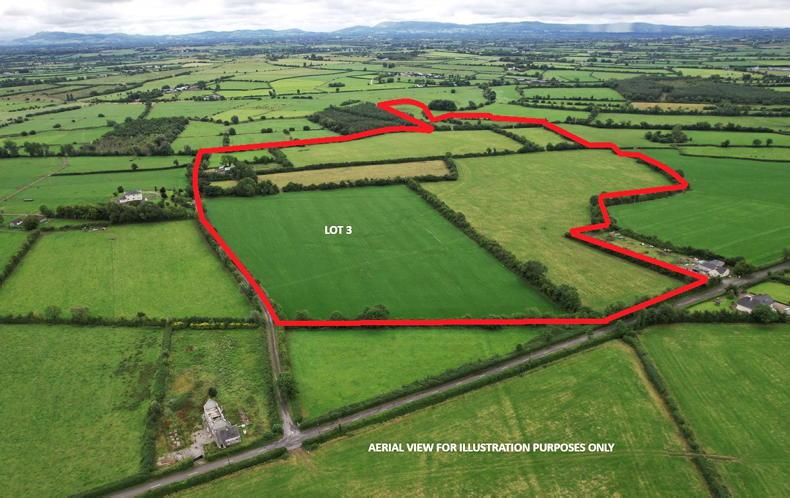

SHARING OPTIONS